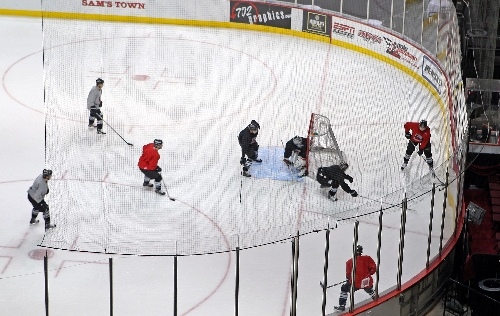Executive strives to market hockey in Las Vegas


When Billy Johnson arrived in Las Vegas in 2003 the Wranglers were a new member of the ECHL in a city that had seen a number of professional sports franchises arrive with a lot of fanfare before quietly shutting down their operations.
Among the approximately 23 teams that have called this city home were the Las Vegas Americans of the Major Indoor Soccer League and the Las Vegas Thunder of the International Hockey League.
The city’s history with professional football is brief. The Las Vegas Posse (1994) of the Canadian Football League and the Las Vegas Outlaws (2001) of the XFL each lasted a season. The Locomotives of the United Football League arrived in 2009 and have won back-to-back championships.
"I’d like to think we’ve raised the interest in Las Vegas for hockey since we got here in 2003," said Johnson, who spent a decade as an executive in minor-league baseball with the Nashua (N.H.) Pride, Kinston (N.C.) Indians and Chattanooga (Tenn.) Lookouts.
"It’s a different economic model," he said. "In baseball players are property of their major-league club, while in hockey we hire the players at $525 a week unless they are sent to us by the Phoenix Coyotes, our National Hockey League affiliate."
Johnson said that in the beginning the business was more about entertainment than sport, which bothered traditional hockey fans.
"Hockey is a sport that has tended to take itself very seriously," he said. "So, when a bunch of us baseball guys made the jump to hockey, some of the stuff we tried to do wasn’t greeted so warmly."
The Wranglers continue to hold their annual midnight game; this year’s game took place on Monday at 11:59 p.m., a 5-3 loss to the Utah Grizzles. Other promotions have included mullet hat night and a giveaway of orange vests in 2006 following a hunting accident involving former Vice President Dick Cheney.
Johnson said simply it’s about "making a dollar." He attributed the failure of other teams in Las Vegas to owners putting too much stock into the game and not promotions then failing to understand why fans don’t show up.
David Carter, professor of sports business at the University of Southern California’s Marshall School of Business, agreed with Johnson. He said minor-league sports is about "great customer service," because not all fans go just to watch the game.
"With minor-league sports, the whole goal is to develop talent. You are hoping the players will develop and move on," Carter said. "Whether it’s Las Vegas or Ames, Iowa, to sell minor-league sports it’s about the quality of the fan experience."
The Wranglers had initial success in filling the Orleans Arena. But the valley’s recession has hurt the team’s attendance and profitability.
When asked whether the Wranglers were profitable, Johnson said the team was still in the red, but "viable."
In sports, he said: "Viability is defined as the tolerance of any ownership at any given time to lose money. We are close enough … at the moment. It’s a good thing."
That owner with a tolerance for losing money is Gary Jacobs. He bought the Wranglers in June for an undisclosed amount from Jonathan Fleisig, who also owns the ECHL’s Bakersfield Condors.
Jacobs, the managing director of Jacobs Investment Co. LLC in San Diego, is also the owner the Lake Elsinore Storm baseball team, a member of the California League and an affiliate of the San Diego Padres.
"We are very happy with the new ownership in Las Vegas," ECHL Commissioner Brian McKenna said. "It’s been a rough couple of years, but we expect to see marginal growth this year not just in Las Vegas, but across our league."
The ECHL is well positioned for growth when the economy recovers, McKenna said. A city the league would consider for expansion is Reno.
"Reno is one area that we have look long and hard at placing a team in," he said. "We need a stable ownership group and a renovated or new arena to make sure the club is successful."
Johnson would welcome a team in Reno to reduce travel costs.
"The biggest expense for teams out West is travel, because in the East you got a 90-minute bus ride to your neighboring city that probably has a team," he said. "Here, we travel to Idaho. Alaska is a pain. They are a good rival but it’s very expensive getting up there and back twice a year."
On Tuesday, the Wranglers with 20 players, two coaches, trainers and their equipment will travel to Anchorage, Alaska, to play three games in four days against the Aces. Johnson declined to discuss travel costs.
Meanwhile, a search of airfares on Orbitz.com found the cheapest round-trip ticket between Las Vegas and Anchorage was $891 per person, which would work out to $20,493 for a traveling party of 23 players, coaches and trainers.
That doesn’t include hotel rooms and food while on a road trip. The hotel expense was reduced through league sponsorship deal with Choice Hotels, according to the ECHL.
"It’s not the expense side that actually gets you, it’s the revenue side," Johnson said. "The challenge we face that other teams in our league don’t is that in our lease, we have no secondary revenue stream."
For seven years, the Wranglers have been the anchor tenant of the Boyd Gaming Corp.-owned, 9,500-seat Orleans Arena, adjacent to The Orleans.
"We are very limited in the promotional things we can do here in this building, being part of a casino," he said. "Any local or Strip properties don’t want to send their people to other casinos."
Johnson said that attitude has made it difficult, but not impossible for his club to sell ticket packages to groups from other hotel-casinos.
"The hardest message we have, and I’m sure the people from Orleans won’t appreciate me saying this, is that you can come to our games," he said. "We do have separate entrances and exits for people attending our games."
The lack of income generated from parking, food and luxury suites affects the Wranglers’ revenues. Johnson said you go to Toledo, Ohio, and fans are paying $8 to $10 to park their cars, with most of that revenue going to the team.
"Our only revenue sources are tickets and sponsorships," he said. "The Orleans has been very creative with us over the last three to four years in finding solutions to our revenue challenges. But we also understand what the purpose of this building is for them … it’s to draw customers into the casino."
One of those creative solutions was for The Orleans to sponsor the jersey the team wears during pregame warm-ups.
So far in 13 home games this season, the Wranglers have averaged 3,704 fans per game. During a recent two-game series with the Idaho Steelheads, the team averaged just more than 5,000 per game. The Wranglers drew 3,168 fans for a Dec. 19 afternoon game against the Steelheads.
Johnson attributed the team’s slow start at the gate to the valley’s continued weak economy.
"The economy really doesn’t help," he said. "This is also a difficult and expensive market to promote in, particularly with a sub-$20 ticket and only 36 homes games."
USC’s Carter said the economy has caused fans to "sit back and contemplate whether they are getting value for their entertainment dollar." He said a lot of sports fans are now spending those dollars "enhancing their in-home experience" instead of buying tickets.
Carter stressed that minor-league franchises, including the Wranglers, Locomotives and Las Vegas 51s, need to use Facebook, Twitter and other new media to expand their fan bases.
For the 2009-10 season, the Wranglers finished 12th in a 19-team league in attendance. Las Vegas totaled 156,591 fans in 36 homes games, for an average of 4,350 per game.
"All trend lines have begun pointing up, which is a reversal from the last two or three seasons," he said. "Our attendance for the first couple of years was spectacular and we were doing well. We were a reflection of the economy."
Now with the economy still struggling to recover, it comes down to doing m ore with less. He said there wasn’t any business in Las Vegas that couldn’t cut 20 percent off its expense base.
Contact reporter Chris Sieroty at csieroty@reviewjournal.com or 702-477-3893.
BILLY JOHNSONCompany: Las Vegas Wranglers.
Position: President and chief operating officer.
Age: 45.
Quote: “I’d like to think we’ve raised the interest in Las Vegas for hockey since we got here in 2003.”
NHL Affiliate: Phoenix Coyotes.
Home Arena: Orleans Arena.
Bio: Billy Johnson is in his seventh season with the Wranglers and his fifth as president and COO. The Louisville, Ky., native moved to Las Vegas after five years as vice president and general manager of the Nashua (N.H.) Pride in Minor League Baseball’s Atlantic League. During his tenure, he was named Atlantic League Executive of the Year in 2000.












